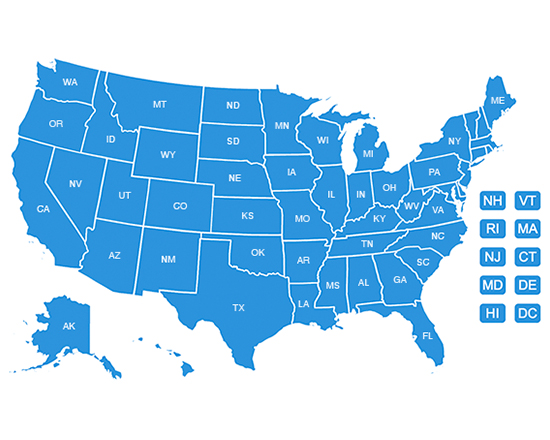The Nursing Home Law Center is committed to providing the legal resources necessary to hold negligent facilities accountable.
Assisted Living Abuse Lawyer
Expert Legal Counsel for Victims of Abuse in Assisted Living Homes
When you send your loved one to an assisted living facility, you expect that they are getting the proper care. Unfortunately, that’s not always the case.
The National Council on Aging reports that 1 in 5 older adults have been the victim of some form of elder abuse, and that includes older adults who are in assisted living facilities. If you or someone you know has been the victim of assisted living abuse, the Nursing Home Law Center can help.
Recent Assisted Living Facility Settlements
When a patient is injured at an assisted living home–a place that is supposed to take care of them and protect them–it can be devastating for them and their families. In these cases, they deserve justice and to be able to hold the facility accountable, which is often done through filing a lawsuit. Below are some recent settlements we’ve obtained for assisted living abuse.
$570,000: We obtained this settlement on behalf of a resident who used a walker fell after being directed to take the stairs instead of waiting for a stairlift. This led to serious facial injuries and a torn rotator cuff that required two surgeries.
$12,800,000: An assisted living facility faced a large verdict after a patient’s untreated pressure sores led to their death.
$810,000: A dementia patient was sexually assaulted by a maintenance worker in a assisted living home, leading to a significant settlement. The incident raised questions about staff supervision and background checks.
$710,200: An elderly Alzheimer’s patient suffered abuse at the hands of a staff member who had a known criminal past. Hiring practices at the facility were examined, and a settlement was reached following allegations of negligence.
These assisted living abuse cases show just how serious neglect and abuse in assisted living homes can be, and they demonstrate how victims have successfully taken legal action. If you or a loved one has experienced similar harm, our team is here to help.
Common Types of Abuse in Assisted Living Facilities
There are common forms of assisted living abuse that you can look out for in your loved ones. We handle cases of these types of abuse and more.
Physical Abuse
Physical abuse is intentional physical harm that is inflicted upon another in an assisted living facility. It often includes hitting, shaking, slapping, pushing, or kicking another person. Excessive and unjustified restraint is also considered physical abuse.
Signs you can look out for include:
- Bruising
- Cuts
- Broken bones
- Unexplained injuries
- Restraint marks
Physical abuse is one of the most visible forms of abuse involving assisted living residents, so be aware that perpetrators may try to leave the injuries in less common places to hide them.
Emotional Abuse
Emotional abuse is often verbal abuse that leads to emotional distress or mental anguish. This is usually accomplished through humiliation, yelling, intimidation, or isolation. It is a form of psychological abuse that can lead to emotional trauma.
Because there are no visual signs of emotional abuse, you’ll want to keep an eye out for more subtle signs in your loved one, like:
- Changes in behavior
- Fear or employees
- Emotional outbursts
- Lack of confidence
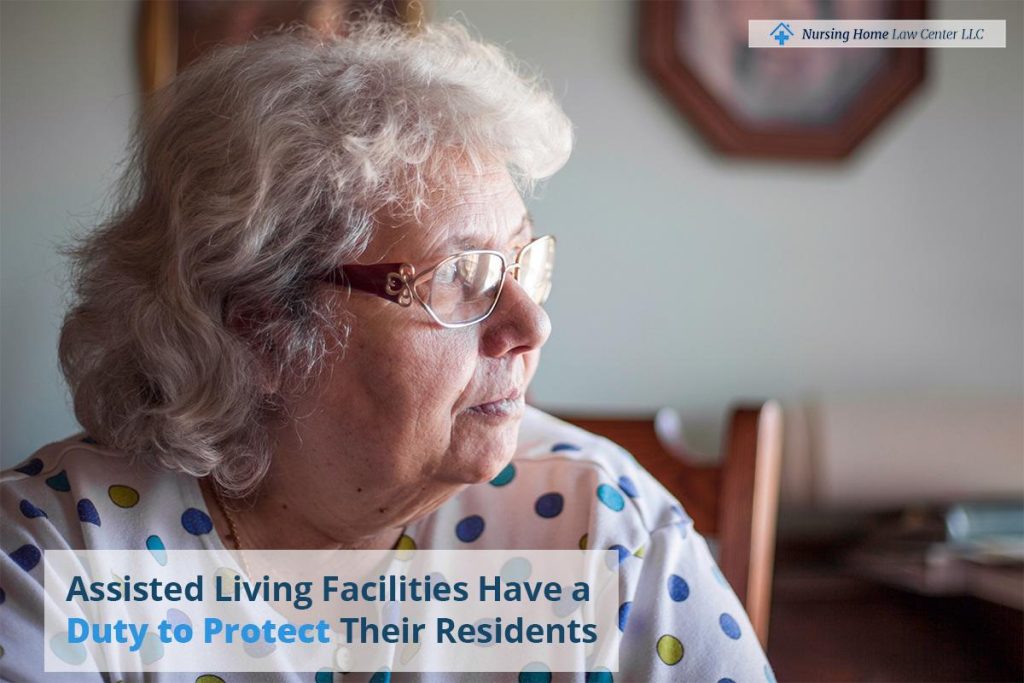
Sexual Abuse
Sexual abuse in assisted living facilities and nursing homes is unfortunately common. It is unwanted sexual contact of any type, including rape, touching, sexual harassment, and more. Signs you can look out for sexual abuse in a care facility are:
- Sexually transmitted diseases
- Physical injuries
- Behavior change
- Extreme fear of staff
Anyone can be a victim of sexual abuse, including nursing home residents of any age.
Financial Abuse
Financial abuse is when another person exploits the older adult financially. It can be hard for family members to spot, but here are somethings to look out for.
- Changes in wills, life insurance policies, or legal documents
- Unauthorized transactions
- Theft
It is essential to monitor your loved one’s accounts when they are in an assisted living facility and report any fraudulent activity as soon as possible.
Neglect
Nursing home neglect occurs when an assisted living facility fails to provide the care needed to maintain a positive quality of life. It does not meet its patients’ most basic needs, including adequate access to food and water, proper hygiene, medicine, clothing, and more.
It can also be a failure to provide access to proper medical care, especially if an injury occurred due to the neglect. Neglect often has many physical indicators, including:
- Bedsores
- Weight loss
- Dehydration
- Unsanitary living conditions
Vulnerable residents deserve justice for the abuse or neglect they face on a daily basis.
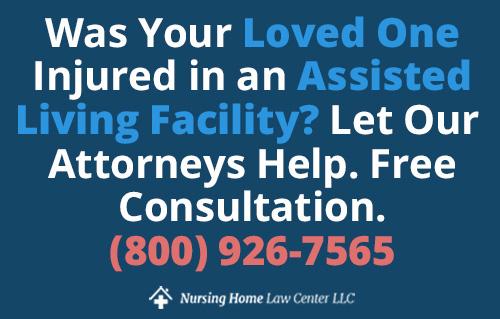
Legal Rights of Assisted Living Facility Residents
If you or a loved one have faced abuse in a care facility of any type, you have legal options. Elderly residents have a reasonable expectation of proper care in nursing facilities. They can seek legal representation from an assisted living abuse lawyer or law firm if they have experienced any kind of neglect or abuse.
Resident Rights
As a resident of an nursing home, you have the following rights:
- Right to be free from abuse and neglect
- Right to dignity, respect, and privacy
- Right to participate in your own care decisions
- Right to complain without fear of retaliation
If any of these rights have been violated while at an assisted living facility, speak with a law firm to hold the facility accountable.
Who Can File a Lawsuit for Assisted Living Abuse?
In some cases, the victim of abuse may not be able to file a lawsuit themselves, either due to cognitive impairment or because they have passed away. In these situations, certain family members or legal representatives may step in.
- The Resident – If the victim is mentally competent, they can file a lawsuit on their own behalf with the help of an experienced law firm.
- Power of Attorney (POA) – If the resident is alive but unable to act due to conditions like dementia, their legally designated power of attorney can pursue legal action.
- Personal Representative or Executor – If the resident has passed away, a court-appointed representative (such as an executor of the estate) may be able to file the claim.
- Family Members – Family members, like spouses, adult children, or other next of kin, may be able to bring a claim with the help of a law firm, depending on state laws.
If you are unsure who can file a claim on behalf of your loved one, an assisted living abuse lawyer or law firm can help determine the right course of action.
Legal Actions You Can Take Against Assisted Living Abuse and Wrongful Death
If your resident’s rights have been infringed upon, you or your loved ones can pursue the following legal remedies.
- Negligence claims: If the assisted living facility failed to meet the standard of care owed to its residents and that negligence caused harm, you can file a civil claim. This can include instances of failing to provide adequate supervision, proper medical care, or maintaining a safe environment.
- Breach of contract: Assisted living facilities are required to uphold the agreements they make with residents and their families. If they fail to deliver the services promised in those agreements, you can pursue a breach of contract claim.
- Wrongful death: When abuse or neglect in an assisted living facility leads to the loss of life, this claim allows surviving family members to seek compensation.
Why Choose Nursing Home Law Center for Your Case
When you want to file an abuse and neglect lawsuit, you want to ensure that you select the right nursing home abuse lawyers. That’s where the Nursing Home Law Center comes in. Here’s why we’re the right choice:
Experience in Assisted Living Facility Abuse and Neglect Cases
Our law firm has extensive experience handling elder abuse and neglect cases; we’ve successfully represented victims and their families for years. Our team understands assisted living facility regulations, elder law, and personal injury claims. With access to investigators and medical experts, our law firm is well-equipped to guide you through the legal process.
Compassionate and Dedicated Law Firm
We approach every case with sensitivity and care, recognizing the challenges victims and their families face. Protecting your privacy and maintaining confidentiality are priorities for us. Abuse and neglect are unacceptable, and we are committed to standing by your side and fighting for the justice you deserve.
Transparent Guidance At Every Stage
Legal proceedings against an assisted living facility can feel overwhelming, but our law firm strives to keep you informed and empowered throughout the process. From the first consultation to the resolution, we will explain your options clearly and work to achieve a fair outcome.
Abuse and neglect are never acceptable in any situation, and you deserve legal representation that will fight for you every step of the way.
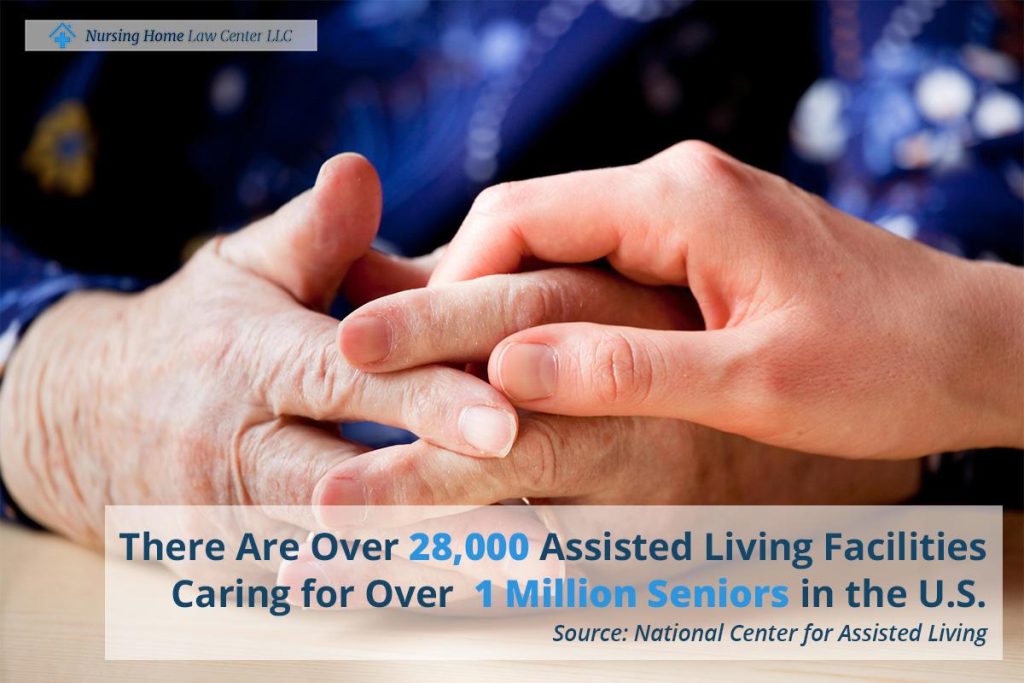
Common Assisted Living Injuries That May Warrant a Lawsuit
Assisted living facilities are expected to provide a safe and supportive environment for their residents, but unfortunately, negligence and misconduct can lead to serious harm. Below are some common injuries and incidents that may justify pursuing a lawsuit against an assisted living facility:
- Frequent Falls – Repeated falls can result in fractures, traumatic brain injuries, or even death.
- Bedsores (Pressure Ulcers) – These painful wounds often occur due to a lack of proper care from the assisted living facility.
- Infections – Poor hygiene practices or delayed medical intervention can lead to preventable infections that significantly harm residents.
- Elopement (Wandering Away) – When residents of the assisted living facility are unsupervised and leave the facility, they are at risk of injury or death.
- Choking Incidents – Improper meal preparation or lack of monitoring during meals can put residents at risk of choking.
- Burns – Burns may stem from accidents involving hot liquids, equipment, or unaddressed hazards in the facility.
- Boken Bones – Broken bones can occur due to falls, improper handling by staff, or physical abuse. This can lead to significant pain and immobility.
If you or a loved one has suffered from any of these incidents in an assisted living facility, it’s essential to explore your legal options with an experienced law firm and hold these institutions accountable, preventing further harm to them and other residents at the assisted living facility.
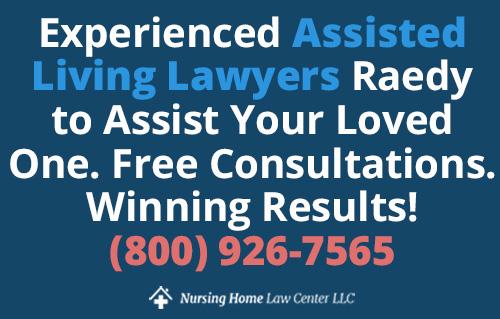
Taking Action After Suspecting Abuse in an Assisted Living Facility
There are steps that you can take if you suspect assisted living abuse or if you know someone is a victim of this crime.
Documenting the Abuse
You want to take immediate steps to document the abuse. Gather evidence and write down all the details you can about the incident at the assisted living home. This includes what happened, who did it, and where it happened. Include the names of any witnesses.
Reporting the Abuse
If you feel comfortable, report the abuse to the authorities. Call the police or file a complaint with the facility administration. There are also elder abuse hotlines that you can call to report the abuse. Call 833–372–8311 to get help.
Seeking Medical Attention
If you were seriously injured or simply wanted to get checked out as a precaution, seek medical attention. Tell the professionals what happened and be specific.
Consulting an Attorney
Contact assisted living facility abuse lawyers like Nursing Home Law Center LLC. We can help you understand your legal rights and options for seeking justice.
What Evidence Is Needed to Build a Strong Assisted Living Abuse Lawsuit?
Building a strong case requires gathering evidence to support your claims. Essential types often include:
- Medical Records – Documentation of injuries, hospital visits, and doctor’s notes to establish the physical impact and timeline of abuse.
- Facility Reports – Incident reports, staff schedules, history of violations, and care plans that reveal neglect or inadequate supervision.
- Photographic & Video Evidence – Visual documentation, like images of injuries or poor conditions at the facility, to prove mistreatment.
- Witness Statements – Testimonies from staff, residents, or visitors who observed abusive behavior.
- Financial Records – Evidence of exploitation, such as unauthorized charges or suspicious transactions.
- Prior Violations – Records of past complaints or compliance issues to show a pattern of negligence.
This evidence helps highlight the full extent of abuse and strengthens your case.
How Long Do You Have to File an Assisted Living Abuse Lawsuit?
Filing a lawsuit for assisted living abuse is time-sensitive, so it’s important to understand the deadlines that apply.
- State-Specific Deadlines – The amount of time you have to file a lawsuit, known as the statute of limitations, varies by state. Many states provide a window of 1 to 3 years, while others may allow up to 6 years. For example, Illinois provides a 2-year deadline for personal injury cases and medical malpactice claims.
- Discovery Rule Exceptions – If the abuse or neglect wasn’t immediately discovered, most states allow additional time to file based on when the issue was actually discovered.
- Cases Involving Wrongful Death – If abuse led to a death, there are often separate deadlines for filing claims related to the death. For instance, Maine provides a 6-year deadline for personal injury cases but a 3-year deadline for most wrongful death cases.
Delaying action could result in the loss of your legal right to pursue justice and compensation for the harm suffered.
Understanding and acting within these timeframes ensures you don’t miss the opportunity to hold negligent parties accountable. Speak with an assisted living abuse law firm to make sure you know the statute of limitations for your case.
Liablity for Damages in Assisted Living Abuse Cases
Victims of assisted living facility abuse have the right to hold both the facility and the individuals responsible for their actions liable for damages. To prove the facility’s liability, it is essential to demonstrate that they owed a duty of care to the resident, breached that duty through neglect or misconduct, and that this breach directly caused harm or damages to the victim.
Consulting with experienced assisted living abuse attorneys is critical to understanding your legal options and building a compelling case to hold the facility accountable.
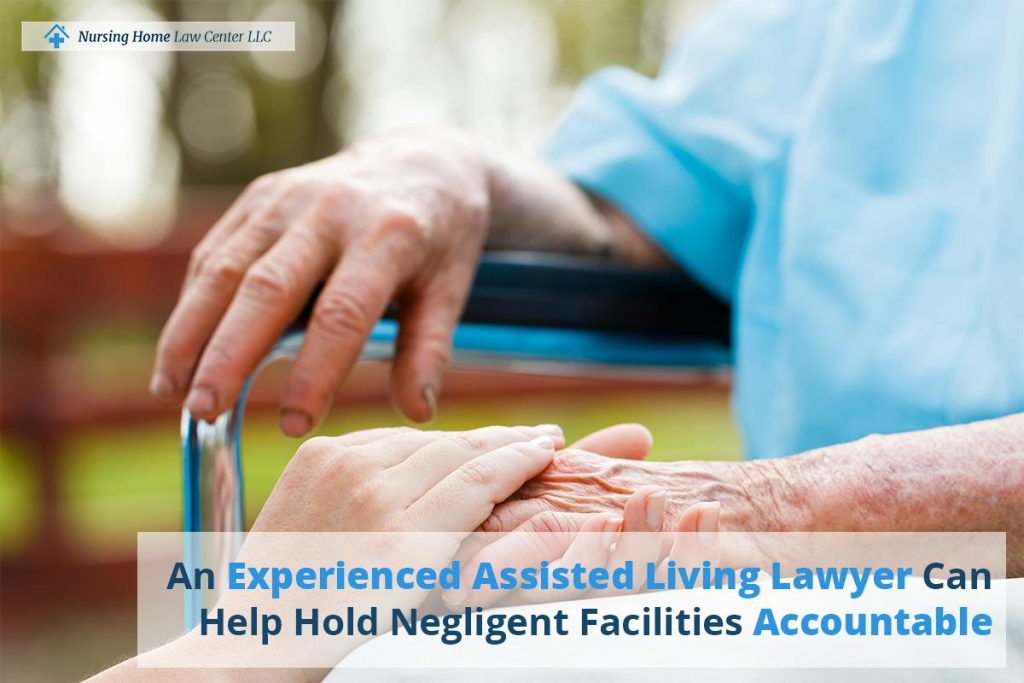
Damages You Can Recover in Assisted Living Abuse Cases
As you pursue your legal options, there are different types of damages that you can recover in assisted living facility abuse cases, and the amount of compensation that you can receive will vary.
Economic
Abuse often has economic impacts, and you can receive damages to help cover these costs. They include:
- Current and future medical expenses
- Mental health expenses
- Lost wages
- Funeral and burial costs for claims where your loved one passed away
Typically, any tangible expense that you or your loved one incurred as a result of the assisted living neglect or abuse can be recovered.
Non-Economic
Non-economic damages address the intangible impacts of assisted living facility abuse. These are just as significant as measurable losses and most often include:
- Physical pain and suffering
- Emotional distress
- Loss of enjoyment of life
- Loss of consortium
Choosing to take legal action may not give you your life back, but it’s a good step to seeking closure and holding the facility accountable.
Punitive
You can also seek punitive damages in some cases. These damages are awarded to punish the perpetrator for their behavior and deter them and others from offending again.
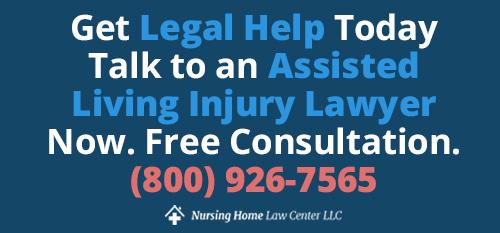
Consult an Experienced Attorney!
Residents of assisted living homes deserve to feel safe and cared for in their care facilities. If this is not the case and you or your loved ones have been the victim of assisted living abuse, you have options.
At Nursing Home Law Center, we can help you navigate the legal process, treating you and your case with the utmost respect. Call us at (800) 926-7565 or use our contact form to schedule your free consultation today. Our team of assisted living facility abuse attorneys can help you seek justice and get compensation.
Common Nursing Home Injuries


